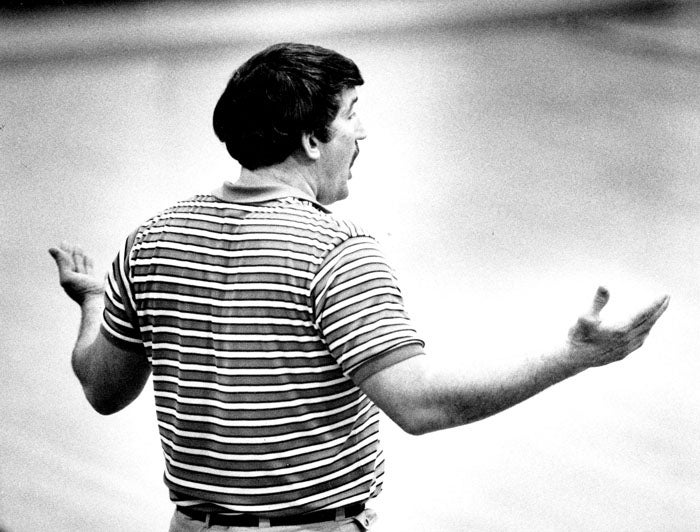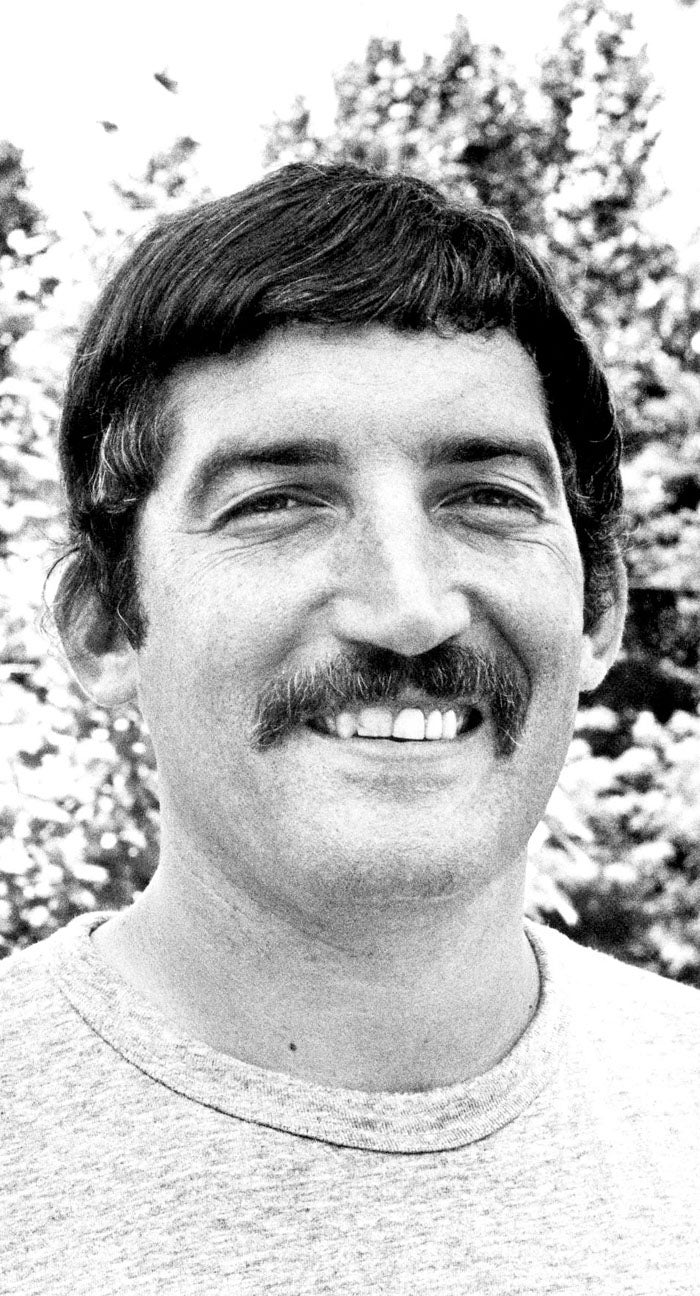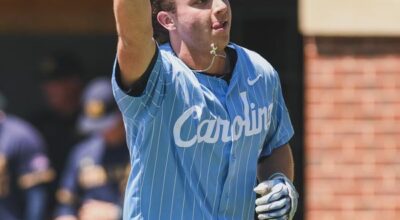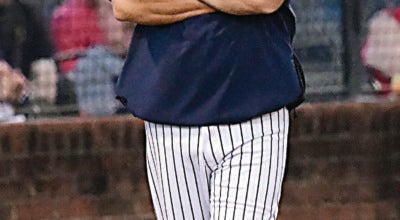Bobby Parker: A lifetime in Rowan athletics
Published 12:00 am Thursday, August 6, 2020

- Bobby Parker
By Mike London
mike.london@salisburypost.com
LANDIS — South Rowan opened back in 1961, but there’s only been one South boys basketball team that Bobby Parker didn’t see play.
That was the 1968-69 squad. He would’ve liked to have seen that one as well, but he was busy in Vietnam.
“And watching a basketball game was not one of the valid reasons they’d let you go home for,” Parker said.
Parker, 74, has spent nearly all of his life playing, coaching or broadcasting sports in Rowan County. He is still “Coach” to a lot of people in the southern sector of the county.
His story starts with his father, John “Buck” Parker, who was in World War II. He was a millhand. He was inducted into the U.S. Army in December 1942, and married Sadie Correll six months later. He was stationed at Fort Benning in Georgia before he shipped out to Europe. He served with General George Patton.
“The war in Europe ends in May 1945, and my father gets to come home for 30 days and then they sent him to the swamps in Louisiana, to Fort Polk, for amphibious training, because there was a different kind of war still going on in the Pacific,” Parker said. “I’m sure there were a whole lot of guys like my father who were like, ‘Wow, we made it!’ But they weren’t out of the woods yet. Everyone believed that they were still going to have to invade Japan, and maybe he doesn’t make it back from that. But then they dropped those two atomic bombs, and suddenly the war is over.”
Bobby Parker — it really is Bobby, not Robert, on his birth certificate — was born on May 15, 1946.
After the war, “Buck” Parker went back to fixing looms in a Cannon Mills spinning room, but he found the time to take his son to hundreds of baseball and football games. He was such a fan of the powerhouse Kannapolis American Legion team that he drove Bobby to road games in far-off places like Cherryville and Hamlet. Bobby learned to cheer for the China Grove players on the Kannapolis team, guys like Johnny Walker and Jim Wagoner and Clyde “Fritz” Slough, but it wasn’t easy for a Landis boy. Landis and China Grove were the fiercest of rivals.
They made road trips as far as Thomasville for Class D games in the old North Carolina State League.
“A love of sports was deeply rooted in me,” said Parker, who started competing in Little League baseball in Landis in 1957. “I still thank my dad for that love of sports every day. And I also thank my mother. We lived two blocks from the old Landis High school and she’d let me walk over there at night, plunk down my 50 cents, watch the girls and boys basketball games, and then walk home. Parents can’t do that now.”
Parker remembers an important assembly for the entire student body at Landis when he was in the ninth grade.
“I must have been the most oblivious person on the planet,” Parker said. “I turn and ask the guy sitting next to me what’s going on, what are we doing here? He told me were voting on the school colors and the mascot for the next school year. And I’m thinking, ‘Now, wait a minute, you mean we’re not going to be here?’ ”
Landis and China Grove were being consolidated into South Rowan High. Parker recalls the piles of dirt, the country roads and the broomsage fields that would be transformed into a new school.
Parker was a sophomore the year South opened. He played on the school’s first basketball team in 1961-62. That team went 4-16.
The next year, South was 2-17.
“Our girls teams were really good because Landis and China Grove had both been good in girls basketball and when you put them together, they were tough,” Parker said. “But the early boys teams weren’t that good.”
But South was a respectable 13-10 Parker’s senior season.
“I was the only starter from Landis — the other four were from China Grove,” Parker said. “So China Grove would’ve killed Landis if we’d still been separate. I’m sure Landis would’ve gone 0-and-20. My theory is there just weren’t a lot of boys born in Landis in 1945 and 1946. It was always a big deal when you played schools like Concord and Kannapolis. They had YMCAs where guys could play indoors. All we had were backyards and driveways.”
The sophomore class was strong when Parker was a senior. South would win its first league championship in boys basketball in 1966 with players such as Denny Hogan, Ben Basinger, David Teague, Jerry Overcash and South’s first Black standout — Daryl Gibson.
After graduating from South in 1964, Parker headed to Wingate Junior College, and then to Appalachian State. He still wasn’t sure what he wanted to do, drifted along and dropped out.
He was drafted almost immediately and entered the U.S. Army in December 1967.
“Eight weeks of basic training and eight weeks of specialized training, and then I was on my way to Vietnam,” Parker said.
He was part of “Long Lines Battalion North,” communications specialists. Mostly his job involved maintenance on huge generators. He worked in terrible heat for a while, but then he learned the necessary skills to shift to an air-conditioned area.
“Those were 12-hour shifts, 8 at night until 8 in the morning, but air conditioning is as good a motivator as there is to learn new things,” Parker said. “I was working, at first, in 90-degree temperatures with 90-percent humidity, and that makes you appreciate air conditioning. There were technical guys who could do things I couldn’t do, but there were only about five different things that could go wrong. I knew enough to do the job.”
Lots of long, lonely hours gave Parker a chance to reflect on what he wanted to do with his life when he got out of the service. It was during those endless nights in Vietnam, 14 months worth, that he figured out that he wanted to stay in sports, and he could do that as a coach. He made up his mind that the first order of business would be to finish his college degree.
“The seed had probably been there a long time,” Parker said. “But it was that time in Vietnam that made me realize that coaching is what I wanted to do.”
He got his feet wet as Terry Jones’ assistant with the 1969-70 South Rowan boys basketball team. In the spring of 1970, he returned to Appalachian State as a more eager, motivated student and graduated in the summer of 1971.
He paid serious dues at China Grove Junior High after he graduated from Appalachian State.
“Steve Beaver, Raymond Daugherty, Steve Mabry and I were coaching three sports, mowing the grass and getting $50 a month for it,” Parker said. “I was coaching the boys and girls ninth-grade basketball teams, driving the bus and being the cheerleading adviser for all the road games. That $50 a month — you’d get it all at one time in a check for $450 at the end of the year — wasn’t much. But it was sports. It was enjoyable.”
It was the fall of 1979 when he arrived at South Rowan as an assistant football and basketball coach.
There was a chain reaction in 1982 when Reid Bradshaw, who was staying on as athletic director, stepped down as South’s football coach. Larry Deal, the head boys basketball coach, was named as the new head football coach. Parker, who had been coaching the jayvee boys basketball team, was elevated to varsity coach, replacing Deal in December.
“My first game as head coach was against Salisbury in the Christmas tournament,” Parker said.
After four losses, Parker logged his first career varsity win in overtime against Sun Valley. That would be his only win that season.
His next two teams were 13-11 and 14-10. Those were South’s last two years in 3A for a long time.
Realignment for the fall of 1985 made South Rowan a 4A school, and the Raiders were playing mostly Greensboro and Winston-Salem schools instead of the Sun Valleys and Monroes of the world.
“Our first Central Piedmont Conference game was against R.J. Reynolds, and it was eye-opening, to say the least,” Parker said. “The kids they were playing with were different than the kids we were playing with.”
He would coach South’s boys in the CPC through the 1998-99 season. It was mostly an uphill fight. There were 182 wins (seventh in county history among boys basketball coaches) and 220 losses.
“We could have kept complaining about it and getting pounded every year or we could try to get as good as the other schools in the CPC were,” Parker said. “I felt like the best way for our guys to become better basketball players was to play 12 months a year. That meant going to teams camps and it meant getting an off-season league started where we played the other Rowan schools, and it meant putting guys on AAU teams. My goal was for our guys to play more games after the season than they played during the season. They did that, and because they did that, we usually kept our heads above water in the CPC. There were a few disastrous seasons, but we usually held our own.”
Parker and his wife, Janice, were married in 1988. She’s been there through all the ups and downs over the last 32 years.
“Marrying her was the best decision I ever made,” Parker said.
The “MeaslesTeam” of 1989, led by South’s all-time leading scorer Larry Lentz, went 8-0 in the CPC.
“They shut things down because a guy from Rowan County who was in college got the measles,” Parker said. “We were down a month before Bob Boswell, who was at A.L. Brown where they were also shut down, made a few calls to friends in the legislature and explained the situation. The phone call came the next day that we were playing again. but that month off hurt us. It’s hard to come back after being off a month.”
South lost in the CPC tournament and in the first round of the playoffs.
Parker coached his son, Adrian, a future Catawba football player, in the 1993-94 and 1994-95 seasons.
“A lot of people asked me about how that went, mostly coaches who were getting ready to coach their own sons,” Parker said. “I had no problems at all, but I was lucky. Adrian was very good, and there was never any question whether he should be on the court. But if you’re the coach and your son is the sixth or seventh man, it’s a different dynamic. The thing I tried to do with Adrian was let him live his life as part of the team and apart from me. If we stopped somewhere to eat on the way back from a game, I didn’t sit next to him. He sat with his teammates. I sat with the other coaches.”
Parker has rows of photos in his basement of all the teams he coached. Most are the standard team pictures, but the 1995-96 team photo is a little different. That teams holds a special place in his heart.
It was a stout team — Tony Propst, Jason Crook, Jason Cross, Ashanti Miller, Cedric Little, David Arey — among others. There were only 10 on the team, and one of them was a small guard named Michael Watson, who was born without a sternum (breastbone).
“We didn’t have a lot of guys come out that year, and we kept Michael as our 10th man rather than bring up the best player on the jayvee team,” Parker said. “My philosophy was always that if you’re good enough for me to keep you, I’ll play you. That philosophy led to great practices. That 1995-96 team built some big leads, and Michael got to play quite a bit. That team didn’t have much size, but there were a lot of high basketball IQs and there was a lot of team chemistry. Michael was a big part of that chemistry.”
“Buck” Parker passed away about six months before the 1995 Christmas tournament. South won it. Arey had 26 in the semifinal win against West Rowan, while Crook had 20 in the final against North Rowan.
South won 20 games that season, and that’s the only Christmas tournament South’s boys have ever won. That’s why the picture of that team in Parker’s basement is different. It’s a picture of the team holding up the championship hardware a few minutes after they won the title in the Catawba College gym.
Parker, who had a stroke in 1996, stepped away from coaching in 1999, turning over the reins to John Davis, his neighbor and one of the best players he ever had.
But he still wanted to stay involved with Rowan sports. That’s when his next career phase started.
He’d been fascinated from the time he was a youngster, listening to Pittsburgh Pirates radio broadcasts on the powerful KDKA station, with sports announcing.
“All my life, I thought it would be the neatest job to tell people what was happening in ballgames,” Parker said. “My friend, Ernie Faw, was related to Carl Ford, who owned radio stations in Kannapolis and China Grove and did play-by-play on football games. I asked Ernie to tell Carl I would be interested if anything ever opened up.”
A few days later, Parker was told to come on down. That was in the fall of 2000.
“Carl already had a color man, so I was the third man on the crew when I started out,” Parker said. “During breaks, Carl would ask me a question. He would say, “Coach, what do you think?’ By the third week, I’d earned my own head set. That was big, getting my own head set.”
In time, Parker would become Ford’s official sidekick and color man, and he’s brought dry wit, county charm and common sense to their broadcasts of South Rowan and Carson games for many years. That partnership has lasted through the 2019 season, although the 2020 season is currently in some jeopardy.
Parker has vision limitations, but he compensates with powerful instant focus binoculars. He reads the papers, so he knows what’s supposed to be happening on the field. He listens closely to Ford’s play-by-play, so he knows what is actually happening.
“Look, I coached high school football for more than 20 years, most of it on the defensive side of the ball,” Parker said. “When I see the formation the offense is using, I know what the defense is supposed to be doing. When I see how the defense lines up, I know what the offense is supposed to be doing. It’s not rocket science. If you know the down and distance, you know what’s coming next. High school football teams are very predictable.”
Parker says offenses and defenses gamble too much now, and that’s why games are higher scoring than they once were.
“I hate to see a team going for it on fourth-and-2 at midfield in the first quarter, but our one cardinal rule is we don’t criticize coaches, and if one of us starts to slip on that the other one lets them know,” Parker said. “I try not to get overly technical with the analysis. Carl frequently reminds me that the average person tuning in isn’t a coach. He just wants to know what the score is and how much time is left. That’s all he needs. He doesn’t care what kind of coverage someone is using.”
It’s been an amazing journey in sports for Parker.
With any luck, he’ll once again be putting a head set to broadcast football games during this school year.
“Athletics are a very integral part of our schools,” Parker said. “Take away athletics, and the dropout rate goes up.”





